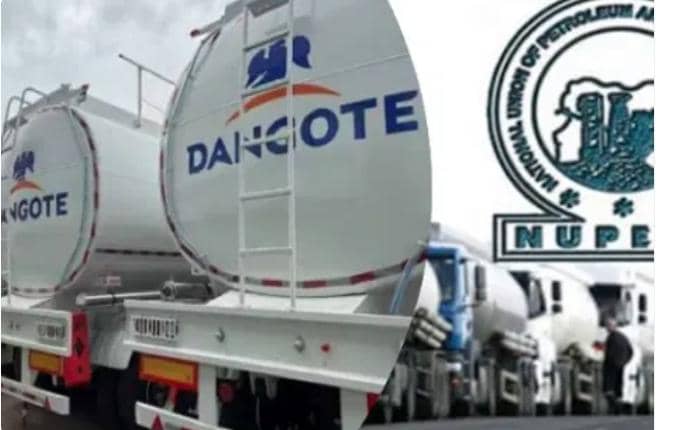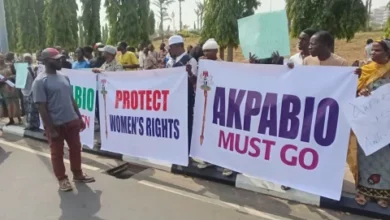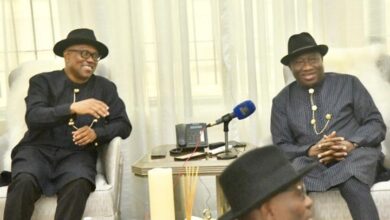NUPENG suspends nationwide strike after DSS-brokered agreement

(DDM) – The Nigeria Union of Petroleum and Natural Gas Workers (NUPENG) has announced the suspension of its nationwide strike against the Dangote Group following a high-level intervention.
Diaspora Digital Media (DDM) gathered that the strike, declared earlier in the week, was triggered by the refusal of the Dangote Group to permit its workers to join the oil workers’ union.
The industrial action, which began on Monday, had raised fears of imminent fuel scarcity and broader economic disruptions, given NUPENG’s central role in petroleum distribution across Nigeria.
According to reports, the strike was suspended after a crucial meeting convened by the Department of State Services (DSS) in Abuja.
The meeting brought together top government officials, including the Minister of Labour, the Minister of Finance, and representatives of the Nigerian Midstream and Downstream Petroleum Regulatory Authority (NMDPRA).
Dangote Group was represented by Seyu Dantata, who led the company’s management delegation during the talks.
Although the exact details of the resolution were not immediately disclosed, both parties reportedly agreed on terms that would allow workers to exercise their rights without escalating tensions further.
NUPENG’s President had earlier emphasized that the refusal to allow Dangote workers to unionize was a violation of labour rights guaranteed under Nigerian law.
The union maintained that it would continue to defend the interests of oil and gas workers across the country, stressing that no employer should be above the law.
The Dangote Group, on its part, had previously insisted that its operations were governed by internal policies, a position that set it on a collision course with the powerful oil workers’ union.
Observers note that this is not the first time NUPENG has resorted to industrial action to press home demands.
Over the decades, the union has established itself as one of the most influential labour groups in Nigeria, often capable of crippling economic activity through strikes.
Its members include petroleum tanker drivers, refinery workers, and staff across the midstream and downstream sectors, giving the union enormous leverage in the nation’s energy supply chain.
Labour experts argue that the Dangote Group’s rising dominance in the petroleum sector following the commissioning of the Dangote Refinery makes this particular dispute significant.
The refinery, touted as Africa’s largest, is expected to play a critical role in reducing Nigeria’s dependence on imported refined petroleum products.
However, the refinery’s integration into Nigeria’s labour ecosystem has already become a flashpoint, with unions demanding that workers enjoy the same protections and collective bargaining rights as their counterparts in other companies.
The DSS intervention reflects the seriousness of the strike, as the security agency rarely steps directly into industrial disputes unless national stability is at stake.
Analysts suggest that the federal government could not afford prolonged disruption in the petroleum sector, especially amid concerns about inflation, rising living costs, and the ongoing economic challenges facing Nigerians.
A prolonged strike by NUPENG would have likely paralyzed petroleum product distribution, worsened fuel scarcity, and triggered further price hikes across the country.
For many Nigerians, the suspension of the strike brings temporary relief, but there remains lingering concern about the durability of the agreement.
NUPENG has warned that it will not hesitate to resume the strike if the Dangote Group reneges on its commitments.
The union’s history of industrial militancy suggests that the matter may resurface if concrete steps are not taken to guarantee workers’ rights.
Meanwhile, the Dangote Group has remained largely silent on the outcome of the meeting, issuing no official statement beyond confirming its attendance at the talks.
Insiders say the company may be seeking to avoid unnecessary public confrontation while balancing its operational priorities with union demands.
Political observers believe this development could also influence broader debates about labour rights, industrial relations, and the balance of power between private conglomerates and workers’ unions in Nigeria.
For now, petrol stations and distribution depots are expected to return to normal activity as NUPENG members resume operations.
However, Nigerians remain cautious, as the underlying tensions between the oil workers’ union and Africa’s biggest industrial conglomerate are far from resolved.
The coming weeks will reveal whether the truce brokered by the DSS represents a lasting peace or merely a pause before another round of labour conflict.
Post Views: 22





